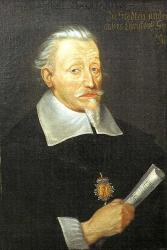Planning worship?
Check out our sister site, ZeteoSearch.org,
for 20+ additional resources related to your search.
- |
User Links
Search Results
Walt's Gott, mein Werk ich lasse
Author: M. Ziegenspeck Appears in 7 hymnals
Walt's Gott, mein Werk ich lasse
[Walts Gott, mein Werk ich lasse]
Appears in 1 hymnal Composer and/or Arranger: Heinrich Schütz Incipit: 13543 21175 765 Used With Text: Walts Gott, mein Werk ich lasse
[Walts Gott, mein Werk ich lasse]
Walts Gott, mein Werk ich lasse
Author: Michael Ziegenspeck Hymnal: Evangelisches Kirchengesangbuch #547 (1969) Languages: German Tune Title: [Walts Gott, mein Werk ich lasse]
Walts Gott, mein Werk ich lasse
Walts Gott, mein Werk ich lasse
Author: Michael Ziegenspeck Hymnal: Evangelisches Kirchengesangbuch #464 (1951) Languages: German
Walts Gott, mein Werk ich lasse
Walt's Gott, mein Werk ich lasse
Author: M. Ziegenspeck Hymnal: Gesangbuch #ad594 (1918) Languages: German
Walt's Gott, mein Werk ich lasse
Heinrich Schütz

1585 - 1672 Composer of "[Walts Gott, mein Werk ich lasse]" in Evangelisches Kirchengesangbuch Heinrich Schütz (baptized Oct. 9, 1585-1672) was the greatest German composer of the seventeenth century and the first to reach international prominence. His influence was felt for more than two centuries after his death.
In 1598, after hearing the young Henrich sing, the Landgrave Moritz of Hessen-Kassel began a campaign to have the boy study at Kassel. In 1599, Christoph Schütz took his son to the landgrave’s seat, where he served as a choirboy and pursued his education showing particular facility in Greek, Latin, and Frence. After he lost his treble voice, he set out for the University of Marburg, where he studied law. But under the sponsorship of the landgrave, Heinrich went to Venice (1609) and studied with Giovanni Gabrieli until Gabrieli’s death in 1612. In 1613 he returned to Germany, once again studying law while serving as organist to the landgrave. He was lent to Johann Georg I of Saxony (1614) and subsequently became director of the chapel, a position he held the rest of his life. The untimely death of his wife after six years of marriage (1625) led him to devote himself to the composition of church music. After several petitions Schütz was granted leave to study with Claudio Monteverdi and once again set out for Venice. For much of his life the Thirty Years’ War obstructed his work, and he spent time moving from court to court in Europe, finally settling in Dresden in 1641, where he died.
--The Presbyterian Hymnal Companion, 1993
Heinrich Schütz
Michael Ziegenspeck
1585 - 1672 Author of "Walts Gott, mein Werk ich lasse" in Evangelisches Kirchengesangbuch
Michael Ziegenspeck


 My Starred Hymns
My Starred Hymns

